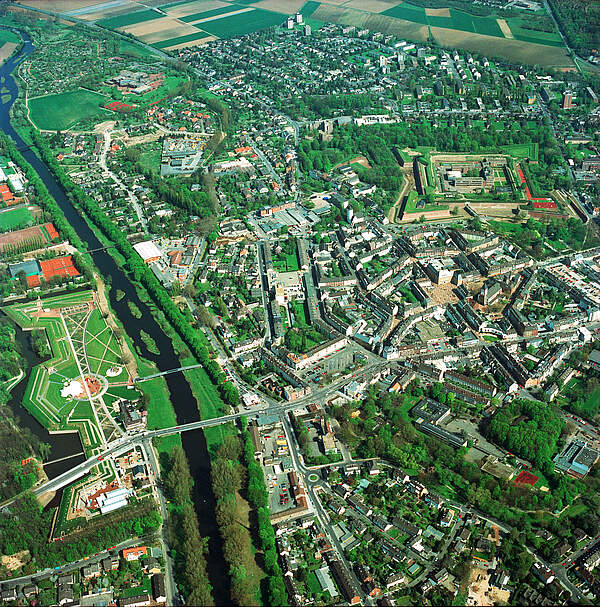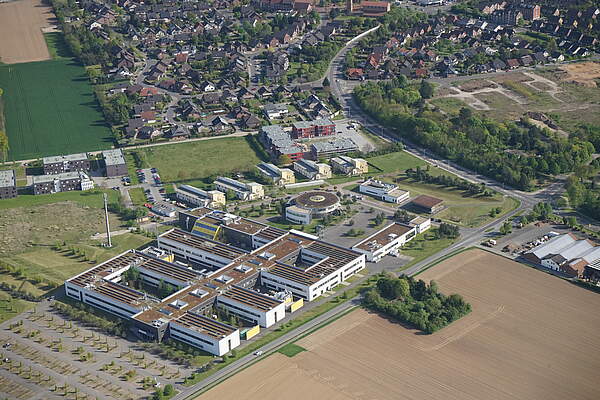Team Presentation
Juelich Historical Society 1923
The Juelich Historical Society (Jülicher Geschichtsverein e.V. - JGV) was founded in 1957 and has been standing in the traditions of the first Juelich Historical Society of 1923. The guiding principle of the society's activities is to increase and maintain the general knowledge and understanding of the history of the city, the old district of Juelich and the Duchy of Juelich. Today, the association has around 320 members. The main focus of the association's activities lies on publishing new findings, experts giving lectures and offering field trips.
The Wednesday Club, a lecture series in cooperation with the Museum Zitadelle Juelich, regularly offers lectures on the various topics of Jülich history. The JGV has several working groups, including one preserving the dialect spoken in the area and another one doing research on Jewish Life in the Juelich area. The association publishes "Jülicher Geschichtsblätter" annually (87 volumes to date). The "Publications of the JGV" (22 volumes to date) and the "Jülicher Forschungen" (14 volumes to date) are published at irregular intervals, the latter being dedicated primarily to topics of the Duchy of Jülich. The association's library has an extensive collection of own and external publications, also by its many exchange partners. It is accessible by appointment.
Town Presentation
Juelich in the interwar period
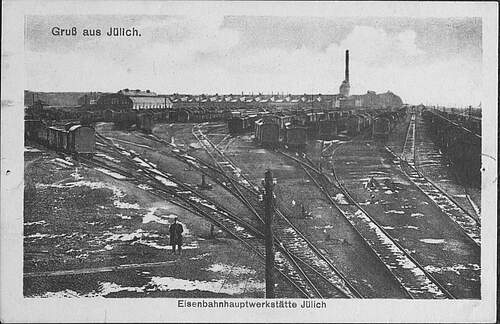
Juelich, with a population of just under 10,000, was a formerly fortified town with a long military history. Until the First World War, the town was the site of a garrison and a non-commissioned officer's and non-commissioned officer's preparatory school. Before the outbreak of the World War, it was decided to withdraw the military from Juelich. As a replacement, a railway repair works with about 2,000 employees was built in the south of the city, which began operations in 1918. This changed the social structure and the political spectrum of the inhabitants decisively through the influx of Socialists and Communists. Until then, the Catholic party Das Zentrum had had a dominant political influence on the people. [Fig. 1]
Juelich belonged to the Belgian-controlled area. On 2 December 1918, the first Belgian contingent arrived in the town. The occupation rule, especially the forced quartering and punishments for disobeying the rules and regulations of the occupation, were felt to be unjust by the population. French troops replaced the Belgian occupants as early as 11 December 1918, although the situation remained tense. The use of colonial troops in particular was viewed critically by the population. [Fig. 2]
The French occupation ended on 5 September 1922, whereupon the Belgians took over in Juelich again. However, the situation did not calm down until after the "crisis year" of 1923, when "passive resistance", "inflation" and the separatist uprising (23rd October 1923) came to an end. The Juelich Historical Society was founded that very year. In 1925, Juelich, like the rest of the Rhineland, celebrated the so-called millennium celebrations for the Rhineland being a part of a Germanic empire profusely. [Fig. 3]
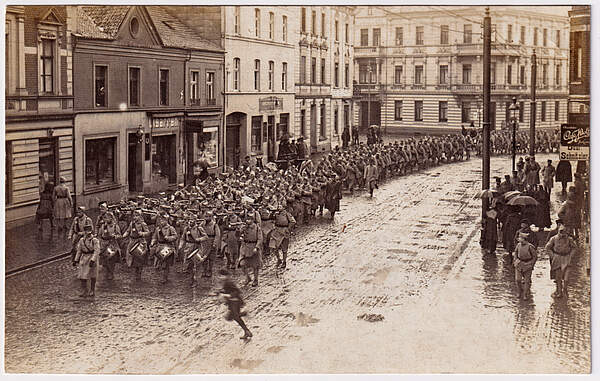
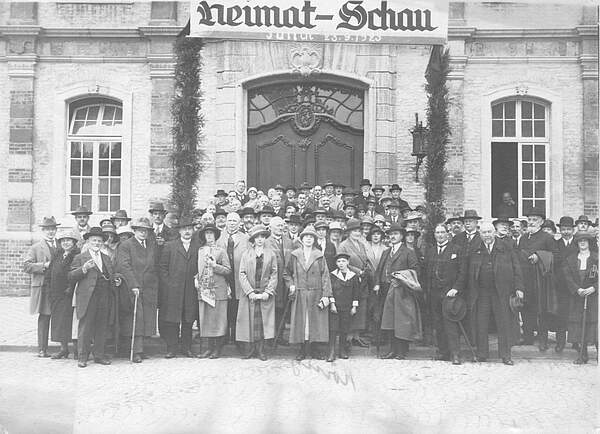
Juelich remained occupied even after 1926, albeit it belonged to zone I, from which occupation forces had redrawn until then. The reason for this was that the Belgians wanted to retain access to the railway repair works. The occupation period did not officially end until 1 December 1929, even though the Belgian military had already left Jülich at the end of October. The head of the County of Juelich and the mayor initiated "liberation celebrations" under the slogans "Freedom, Homeland, Fatherland", which took place on 30 November 1929. The well-documented speeches and public comments show a strong national German sentiment. The perspective adopted then was one-sided, interpreting the festivities as a retrospective victory. The organisers made an effort to appear non-partisan, but only managed to instil a limited feeling of community that was able to bridge political differences. The hope of having attained "freedom" came to an early end only four years later at the arrival of the era of National Socialism.
Juelich today
[Fig. 4] With around 33,000 inhabitants, nowadays Juelich is a booming smaller town with a high quality of living. The city offers a modern and efficient infrastructure as well as a rich cultural life. Aside the core town, Juelich consists of 15 districts or villages. These are characterised by a more rural character, a often rich history and a penchant for traditional clubs. Being part of the technologically advanced region of Aachen, Juelich can be proud of its high research and development potential with the Juelich Research Centre, the Juelich Technology Centre, the Juelich Campus of the Aachen University of Applied Sciences and the solar thermal experimental power plant (German Institute of Aeronautics and Astronautics), the latter which can only be found in a few locations worldwide. [Fig. 5] Juelich offers extensive sports and leisure facilities in its indoor and outdoor swimming pools, sports halls and stadiums. The Brückenkopf Park has established itself as a summer crowd-puller, offering exciting and family-friendly recreational opportunities on the grounds of a former state garden show. In the heart of the city is the Citadel, an outstanding architectural monument from the Renaissance. Together with the bridgehead from Napoleonic times, it forms a unique fortress ensemble. Today, Juelich is a historic fortified town and a modern research town.
